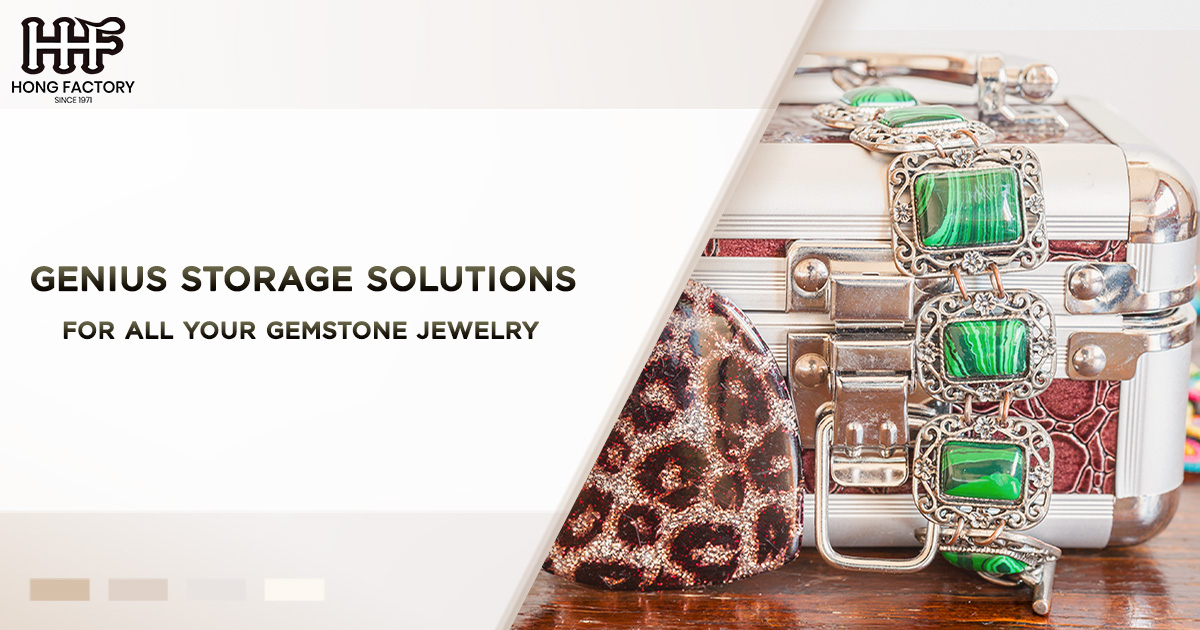Gemstone jewelry is more than just an accessory; it’s a reflection of personal style, a symbol of important moments, and often an investment. Whether you own sparkling diamonds, dazzling emeralds, or delicate opals, each gemstone requires careful storage to maintain its beauty and longevity. Proper organization and protection are key to ensuring your collection remains as pristine as the day you acquired it. In this article, we’ll explore genius storage solutions tailored to different gemstones and discuss effective ways to keep your jewelry safe, organized, and shining for years to come.
Why Gemstone Storage Matters
The properties of gemstones vary widely, meaning different types of stones require different methods of storage. Some gemstones are fragile and prone to scratches, while others are hard but can still suffer from environmental exposure. Without proper storage systems, your precious jewelry pieces may become damaged, lose their luster, or even break. Organizing your collection not only ensures easy access but also protects your gems from unnecessary wear and tear. Let’s dive into specific storage solutions for various types of gemstones.
1. Diamonds – The Hardest Gemstone, But Not Invincible
Diamonds are renowned for their hardness, ranking a 10 on the Mohs scale. However, they can easily scratch other gemstones and even metals if stored improperly. While diamonds are resilient, they still require careful storage to avoid damaging other pieces in your collection.

Storage Tips for Diamonds
- Individual Compartments : Keep each diamond piece in its own compartment to prevent it from scratching softer gemstones or metals.
- Soft Lining : Store diamond jewelry in a box with a soft, velvet-lined interior to prevent any accidental scratches or chips.
- Avoid Clustering : Never store diamond jewelry together with other gemstones. Even though diamonds are hard, they can cause damage to other softer stones in close proximity.
By using proper storage methods like individual compartments and soft linings, you can ensure your diamonds remain brilliant while protecting other pieces.
2. Pearls – Delicate and Organic
Pearls are organic gemstones, meaning they are much softer and more fragile than many other stones. They are highly susceptible to scratches and can lose their luster if exposed to harsh chemicals, moisture, or excessive dryness. Proper storage is essential to maintain their creamy, soft glow.
Storage Tips for Pearls
- Soft Cloth Pouches : Store pearls in soft cloth pouches (preferably made from silk or cotton) to protect their delicate surface from scratches.
- Separate Storage : Keep pearls separate from other types of jewelry. Pearls are easily scratched by harder gemstones and metals.
- Avoid Airtight Containers : Pearls need to “breathe.” Store them in a location with moderate humidity to prevent them from drying out, which can cause cracking.
Using the right storage systems, such as cloth pouches and separate compartments, helps ensure that your pearls retain their natural beauty without fading or cracking.
3. Opals – Sensitive to Temperature and Light
Opals are among the most sensitive gemstones. They are composed of a significant amount of water, making them prone to drying out and cracking if exposed to extreme heat, dryness, or direct sunlight. Their vibrant play-of-color can also fade if they are not stored properly.
Storage Tips for Opals
- Moisture-Retaining Pouches : Store opals in pouches that help retain a bit of moisture. You can even store them with a damp cotton ball to keep them hydrated.
- Avoid Direct Sunlight : Never store opals in direct sunlight or in close proximity to heat sources. This can cause the stone to lose its moisture and eventually crack.
- Temperature-Controlled Storage : For long-term storage, consider keeping opal jewelry in a controlled environment with stable temperature and humidity levels.
By taking these protective measures, you ensure that your opals maintain their vibrant color and don’t suffer from environmental damage.
4. Emeralds – Prone to Cracks and Inclusions
Emeralds are known for their deep green color, but they are also relatively soft and can contain natural inclusions that make them prone to cracking if not handled properly. They require special care to avoid damage during storage.
Storage Tips for Emeralds
- Soft, Cushioned Boxes : Store emeralds in cushioned boxes to protect them from impact, which can cause cracks.
- Avoid Pressure : Be careful not to store emeralds under heavy jewelry pieces that could press down on them and cause damage.
- Regular Cleaning : Clean emerald jewelry regularly before storing to remove any oils or dirt that could affect the stone’s clarity over time.
Proper organization and protection are crucial for emeralds, as soft linings and cushioned boxes will help prevent accidental damage.
5. Sapphires and Rubies – Durable, Yet Vulnerable to Scratches
Sapphires and rubies are relatively hard stones, ranking 9 on the Mohs hardness scale, but they are still susceptible to scratches and chips if stored improperly. While they can endure more than softer gemstones, they still need to be organized carefully.
Storage Tips for Sapphires and Rubies:
- Separate from Other Gemstones : Store sapphires and rubies in separate compartments from softer gemstones to prevent unintentional scratching.
- Padded Compartments : Use padded jewelry boxes or cases to provide a cushioned environment for your sapphire and ruby pieces.
- Avoid Heat Exposure : Avoid storing these gemstones in heat-prone areas, as high temperatures can affect the appearance of colored stones over time.
With proper storage systems that include padded compartments and separate spaces, you ensure your sapphires and rubies remain brilliant and scratch-free.
6. Turquoise – Soft and Sensitive to Chemicals
Turquoise is a softer gemstone, ranking between 5 and 6 on the Mohs scale. It is also porous, meaning it can absorb oils and chemicals that can discolor the stone over time.
Storage Tips for Turquoise
- Avoid Plastic Bags : Plastic can trap moisture and cause turquoise to discolor. Instead, store turquoise in fabric pouches or soft-lined boxes.
- Keep Away from Chemicals : Ensure that turquoise is kept away from cosmetics, perfumes, and cleaning solutions, which can cause the stone to lose its color.
- Low-Humidity Storage : Keep turquoise in a dry environment to prevent moisture absorption, which can lead to discoloration.
By adopting the right storage solutions, such as fabric pouches and avoiding plastic, you keep turquoise jewelry looking vibrant and undamaged.
7. Amethyst and Quartz – Durable, But Can Fade
Amethyst and other varieties of quartz are relatively durable, but they are susceptible to fading when exposed to prolonged sunlight or heat. Proper storage will help preserve their rich colors.
Storage Tips for Amethyst and Quartz
- Store in Darkness : Keep amethyst and quartz jewelry in dark, cool places to prevent fading caused by UV exposure.
- Soft Lined Compartments : Use soft-lined compartments or pouches to prevent scratches from harder gemstones.
- Avoid Humidity : Like many other gemstones, quartz can be damaged by high humidity, so store it in a dry environment.
Simple storage solutions like keeping them in the dark and using soft compartments will help preserve the vibrant colors of amethyst and quartz.
Conclusion
Proper storage systems, organization, and protection are vital for keeping your gemstone jewelry in pristine condition. Gemstones vary in durability, sensitivity, and maintenance needs, making it essential to tailor your storage methods to each type of stone. Whether it’s the hardness of diamonds or the fragility of pearls, ensuring that each piece has a designated and protective space will help preserve its value and beauty.
Investing in high-quality storage solutions, such as padded jewelry boxes, moisture-retaining pouches, and temperature-controlled environments, will ensure your gemstones stay safe from scratches, environmental damage, and wear. By carefully organizing your collection and using the best storage methods, you can enjoy your jewelry for years to come, knowing it’s well-protected and properly cared for.





